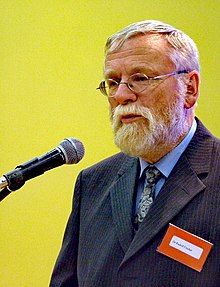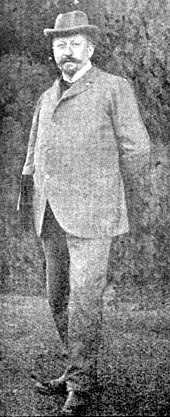German Esperanto Association
The German Esperanto Association (DEB; in Esperanto: Germana Esperanto-Asocio , GEA) is a registered association founded in 1906 with its seat in Berlin, whose primary goal is the promotion of Esperanto in Germany.
Structure and services
The DEB has 1,600 members who are centrally administered; In most federal states there are regional associations, and local groups are also affiliated with the DEB.
The main annual event is the German Esperanto Congress , which the DEB sometimes organizes together with Esperanto associations from neighboring countries. The board is elected every two years at the congress. Ulrich Brandenburg has been the chairman of the DEB since 2017 .
The organ of the association is called Esperanto aktuell , which has had this title since 1982 and has appeared in its current basic form since 1992. For a long time it was divided into a German and an Esperanto-language edition. Books on Esperanto can be obtained from the DEB's book distribution service.
The DEB has its training and further education center in Herzberg am Harz (Interkultura Centro Herzberg, ICH). There you can learn the language and follow lectures, courses and seminars. There is a DEB information center in Berlin . The German Esperanto Institute (Germana Esperanto-Instituto, GEI) is primarily concerned with taking Esperanto language tests.
The independent youth organization Deutsche Esperanto-Jugend e. V. was founded in 1951 and has its office in Berlin . She organizes her youth e-week every year on New Year's Eve. The number of members is around 130.
International
The DEB has been an affiliate of the World Esperanto Federation ( UEA) since 1934 and then again since 1955, and sends delegates to the UEA Association Council. So far eight (including Danzig in 1927: nine) Esperanto World Congresses have taken place in Germany, most recently in Berlin in 1999.
In the past, Germans have been Secretary General or Deputy Chairman of the UEA several times. The German Esperanto Youth is one of the regional sections of the World Organization of Young Esperantists TEJO .
Independently of the UEA, the DEB and the youth organize, for example, joint events with Esperanto associations in neighboring countries. The DEB also supports Esperantists in various African countries .
Some of the largest international Esperanto meetings in Europe take place every year in Germany, such as the International Week of the German Esperanto Youth, the privately organized International Festival or the spring family meeting of the German Esperanto Association.
history
Foundation phase
Important for the history of the entire Esperanto language community is the Nuremberg World Language Association from 1885, which switched from Volapük to Esperanto in 1888 . The first Esperanto magazine, La Esperantisto , was also published in Nuremberg . But this was not the start of the later German Esperanto movement.
As early as 1903, Ludwig E. Meier of the Munich branch had thought of a Germany-wide association, but had not yet dared to take the step of founding it. The Berlin local group published its Esperantist communications in 1904 , which in 1905 became the Germana Esperantisto . This forum then initiated the establishment of a German Esperantist Society in Braunschweig in 1906 . In 1909, the name was changed to the name used today, when the society changed from an association of individual members to a federation of Esperanto groups.
First World War
The war caught the DEB just as unprepared as German society itself, but Friedrich Ellersiek was able to continue the association organ Germana Esperantisto . Of the warring countries, the British Confederation was the most stable. During the war, the organ of the association emphasized German readiness for peace, but was also marked by seriousness and patriotism.
The DEB or a committee initiated by it published the governmental information sheets in Esperanto and sent them to Esperantists in the neutral countries. This approach was later imitated by Esperantists in France and Italy.
Weimar period
The war had strengthened both nationalist and internationalist currents. There was hostility to Esperanto as "western fantasy", but also encouragement. Such was Reich President Friedrich Ebert patron of the World Esperanto Congress in Nuremberg 1923. The Esperanto used as an argument for Esperanto, the international understanding was more important than ever.

Organizationally and strategically, the Weimar period is not very different from the Empire from an Esperanto point of view. What was new was the division of the Esperanto movement into a "bourgeois-neutral" one, to which the DEB belonged, and a "socialist" one with the German Workers' Esperanto Association.
National Socialism
The National Socialist seizure of power in 1933 posed the question of how the DEB can or must adapt to the new situation. On the one hand, there was uncertainty about what exactly the DEB had to do in order to survive (the workers' Esperanto associations were immediately banned). On the other hand, the DEB even hoped that the new regime would use Esperanto in its foreign propaganda, like the Soviet Union or fascist Italy. Self- alignment included the establishment of the Führer principle and finally, in early 1936, the exclusion of Jewish members.
Critics of the adaptation course pointed out that Adolf Hitler had already revealed his opinion about Esperanto in Mein Kampf :
- As long as the Jew has not become the master of the other peoples, he has to speak their languages for better or for worse, but as soon as these were his servants, they would all have to learn a universal language (e.g. Esperanto!), So that by this means too Judaism could rule them more easily!
The situation of the DEB was made more difficult by two further developments: At that time, the international transformation of the Esperanto movement took place, the World Federation became the umbrella organization of the national associations and demanded their official political neutrality. Nationally, a New German Esperanto Movement had been founded, a National Socialist-oriented association that wanted to be recognized by both the state and the World Federation as the sole representative of German Esperantists.
In fact, the National Socialist state remained suspicious of Esperanto. On February 18, 1936, Martin Bormann ordered that NSDAP members were not allowed to work in "art language associations". Since the DEB did not dissolve despite this discouragement, the political police commanders of the federal states dissolved the last Esperanto associations in Germany in June 1936.
Esperanto itself was not forbidden, and so Esperantists met privately to maintain their language skills. During the war, for reasons of censorship, it was forbidden to write letters in Esperanto.
Cold War 1945–1989 and United Germany
The German Esperanto Association was re-established in the three western zones in 1947, initially with Munich as its seat. It continued the tradition of the so-called bourgeois as well as the workers' Esperantists from the pre-war period. But since he joined the apolitical Esperanto World Federation UEA in 1955 , a smaller part of the worker Esperantists founded their own association, the Free Esperanto Federation for the German-speaking areas .

Even during the Soviet occupation, Esperanto organizations were banned in what would later become the GDR . The "working people" were asked to study Russian instead. It was not until 1965 that an Esperanto organization came into being in the GDR, within the Kulturbund . The GDR Esperanto Association had to submit to state guidelines. His official task was to make propaganda for the GDR policy in contact with foreign Esperantists and to unmask the "West German policy of revenge". In 1968, DEB chairman Werner Bormann protested against an assertion by the GDR Association from the previous year that the DEB was financed by the All-German Ministry or defamed the GDR Esperanto movement.
Although there had been individual contacts between East and West German Esperanto friends before 1989, these have remained rather low. Until the Wall was built in 1961, an "interzonal meeting" could still be organized in West Berlin. In 1991 the DEB and the GDR Association merged to form what is now the all-German German Esperanto Association.
See also
Web links
Individual evidence
- ↑ Tasks of the German Esperanto Institute ( Memento of the original from December 22, 2016 in the Internet Archive ) Info: The archive link was inserted automatically and has not yet been checked. Please check the original and archive link according to the instructions and then remove this notice. on esperanto.de
- ↑ Marcus Sikosek: The neutral language. A Political History of the Esperanto World Federation , Bydgoszcz 2006, pp. 86–88.
- ↑ Marcus Sikosek: The neutral language. A political history of the Esperanto World Federation , Bydgoszcz 2006, p. 182.
- ^ Ulrich Lins : The dangerous language , Bleicher Verlag, ISBN 3-88350-023-2 , pp. 100-103.
- ↑ Marcus Sikosek: The neutral language. A political history of the Esperanto World Federation , Bydgoszcz 2006, pp. 184, 187 (there also the quote from Hitler), pp. 204/205.
- ↑ Marcus Sikosek: The neutral language. A political history of the World Esperanto Federation , Bydgoszcz 2006, p. 263, p. 356/357.
- ↑ Werner Bormann: DEB's answer to the Central Working Group of Esperanto Friends of the GDR in the German Cultural Association. In: Germana Esperanto-Revuo , May 1968, p. 52.

